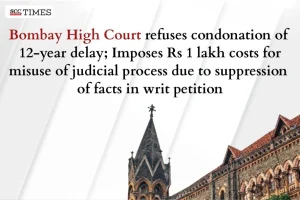Bombay High Court: While hearing a writ petition under Article 226 of the Constitution, wherein the petitioners sought condonation of delay of more than twelve years in filing a revision against the confirmation of auction sale of their mortgaged properties, a Single Judge Bench of Amit Borkar, J., noted that the petitioners had made false statements on oath and suppressed material facts regarding their knowledge of the auction. Since writ jurisdiction is discretionary and based on fairness, the Court dismissed the petition, upheld the refusal of condonation of delay, and imposed costs for misuse of judicial process.
Background:
The petitioners had taken two separate loans in 2005 by mortgaging different properties. In 2007, recovery certificates were issued under Section 101 of the Maharashtra Cooperative Societies Act, 1960 (‘the Act’) for amounts of Rs 68,08,969 and Rs 83,47,098. Upon default, the Special Recovery Officer conducted an auction of the mortgaged properties on 17-09-2009.
The petitioners alleged that the auction purchaser failed to deposit 15% and 85% of the bid amount within the prescribed period under Rule 107(11)(g) and (h) of the Maharashtra Cooperative Societies Rules, 1961, and therefore the auction was void. They filed a revision application under Section 154 of the Act, accompanied by an application seeking condonation of delay of more than twelve years, claiming they first became aware of the auction only in November 2020.
The Bank and auction purchasers opposed this plea, submitting that the petitioners had knowledge of the auction much earlier. They pointed to an application dated 16-09-2011, where the petitioners sought account extracts that clearly reflected the auction proceeds deposited in October 2009. They also referred to a letter dated 16-04-2015, signed by one of the petitioners, acknowledging the auction and appropriation of the auction amount. These documents, according to the respondents, proved that the petitioners were aware of the auction in 2011 and again in 2015.
The respondents argued that the petitioners made false statements on oath and suppressed material facts, and therefore were not entitled to invoke the extraordinary jurisdiction of the Court.
Analysis and Decision:
The Court observed that in spite of this, the petitioners made a categorical statement on oath in the delay condonation application and in the writ petition that they came to know about the auction only in November 2019. This was not an inadvertent error but a conscious and deliberate assertion contrary to the record. The Court held that when a litigant signs a letter acknowledging the auction in 2015 and yet states before the Court that knowledge was first gained in 2019, the only conclusion possible is that a false statement has been knowingly made.
The Court highlighted that the explanation offered by the petitioners that they became aware of the auction only in 2020 was unacceptable and showed a deliberate attempt to mislead the Court. The Court stressed that no litigant has a right to suppress facts and then seek relief. When the foundation of the plea itself is false, the entire case built on it falls.
The Court emphasised that writ jurisdiction stands on the principle of fairness. Any person who comes to the Court for relief must speak the truth. Suppression of facts and false statements strike at the root of justice and cannot be taken lightly. Writ jurisdiction is discretionary and based on equity, and the moment it is shown that a party has concealed facts or made a false statement, the basis of the writ petition collapses.
The Court referred to the observations of the Supreme Court in Amar Singh v. Union of India, (2011) 7 SCC 69, which held that litigation is not a game of moves and counter moves, and that writ jurisdiction is extraordinary and equitable. Relief under Article 226 of the Constitution is refused not as a punishment, but because a person who acts unfairly cannot demand equity. The Court reiterated that a litigant must approach with clean hands, clear facts, and honest disclosure.
The Court noted that the hearing consumed about ninety minutes of judicial time, which belongs to every litigant waiting for justice. Every minute spent on a matter built on falsehood resulted in genuine matters being delayed. The Court observed that imposition of costs was necessary to send a clear message that Court time is valuable and cannot be taken for granted. Costs were imposed not as a punishment but to compensate the respondents and protect the judicial process from misuse.
The Court dismissed the writ petition, upheld the order of the Divisional Joint Registrar refusing condonation of delay. Further, the Court directed the petitioners to deposit costs of Rs 1,00,000 with the Maharashtra State Legal Services Authority within four weeks, failing which the amount shall be recovered as arrears of land revenue.
[Ramrao Tukaram Patil v. State of Maharashtra, 2025 SCC OnLine Bom 4462, decided on 14-11-2025]
Advocates who appeared in this case:
For the Petitioner: Girish S. Godbole, Senior Advocate i/by Shrishailya S. Deshmukh
For the Respondents: P.G. Sawant, AGP; S.R. Nargolkar with Arjun Kadam and Neeta Patil; Abhishek Arote; Vijay D. Patil, Senior Advocate i/by Yogesh V. Patil


